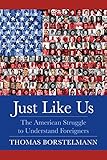Just Like Us : The American Struggle to Understand Foreigners / Thomas Borstelmann.
Material type: TextPublisher: New York, NY : Columbia University Press, [2020]Copyright date: ©2020Description: 1 online resourceContent type:
TextPublisher: New York, NY : Columbia University Press, [2020]Copyright date: ©2020Description: 1 online resourceContent type: - 9780231193528
- 9780231550352
- Americanization
- Cold War -- Social aspects -- United States
- Cold War-Social aspects-United States
- Cultural awareness -- United States
- Cultural awareness-United States
- Cultural pluralism -- United States -- History
- Cultural pluralism-United States-History
- Exceptionalism -- United States -- History
- Exceptionalism-United States-History
- Globalization -- Social aspects -- United States -- History
- Globalization-Social aspects-United States-History
- National characteristics, American -- History
- National characteristics, American-History
- Race awareness -- United States -- History
- Race awareness-United States-History
- United States-Race relations-History
- HISTORY / United States / General
- 305.800973 23
- E169.1 .B759 2020
- online - DeGruyter
- Issued also in print.
| Item type | Current library | Call number | URL | Status | Notes | Barcode | |
|---|---|---|---|---|---|---|---|
 eBook
eBook
|
Biblioteca "Angelicum" Pont. Univ. S.Tommaso d'Aquino Nuvola online | online - DeGruyter (Browse shelf(Opens below)) | Online access | Not for loan (Accesso limitato) | Accesso per gli utenti autorizzati / Access for authorized users | (dgr)9780231550352 |
Browsing Biblioteca "Angelicum" Pont. Univ. S.Tommaso d'Aquino shelves, Shelving location: Nuvola online Close shelf browser (Hides shelf browser)
Frontmatter -- Contents -- Preface -- I. The Challenge of Contact with Foreigners -- II. Freedom: American Culture as Human Nature -- III. Inbound: Immigrants from Internal Threat to Incorporation -- IV. Lurking: Communists and the Threat of Captivity -- V. Outbound: U.S. Expansion Into Foreign Lands -- VI. Subversion: The Power of American Culture in a Global Era -- Conclusion: Not So Foreign After All -- Notes -- Index
restricted access online access with authorization star
http://purl.org/coar/access_right/c_16ec
Americans have long considered themselves a people set apart, but American exceptionalism is built on a set of tacit beliefs about other cultures. From the founding exclusion of indigenous peoples and enslaved Africans to the uneasy welcome of waves of immigrants, from republican disavowals of colonialism to Cold War proclamations of freedom, Americans' ideas of their differences from others have shaped the modern world-and how Americans have viewed foreigners is deeply revealing of their assumptions about themselves.Just Like Us is a pathbreaking exploration of what foreignness has meant across American history. Thomas Borstelmann traces American ambivalence about non-Americans, identifying a paradoxical perception of foreigners as suspiciously different yet fundamentally sharing American values beneath the layers of culture. Considering race and religion, notions of the American way of life, attitudes toward immigrants, competition with communism, Americans abroad, and the subversive power of American culture, he offers a surprisingly optimistic account of the acceptance of difference. Borstelmann contends that increasing contact with peoples around the globe during the Cold War encouraged mainstream society to grow steadily more inclusive. In a time of resurgent nativism and xenophobia, Just Like Us provides a reflective, urgent examination of how Americans have conceived of foreignness and their own exceptionalism throughout the nation's history.
Issued also in print.
Mode of access: Internet via World Wide Web.
In English.
Description based on online resource; title from PDF title page (publisher's Web site, viewed 02. Mrz 2022)









